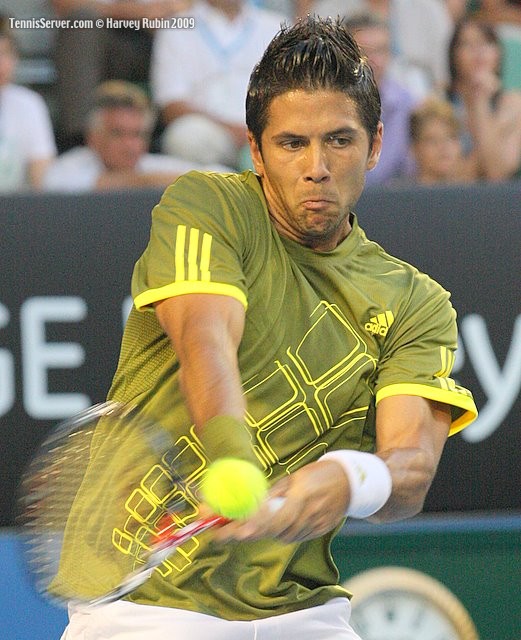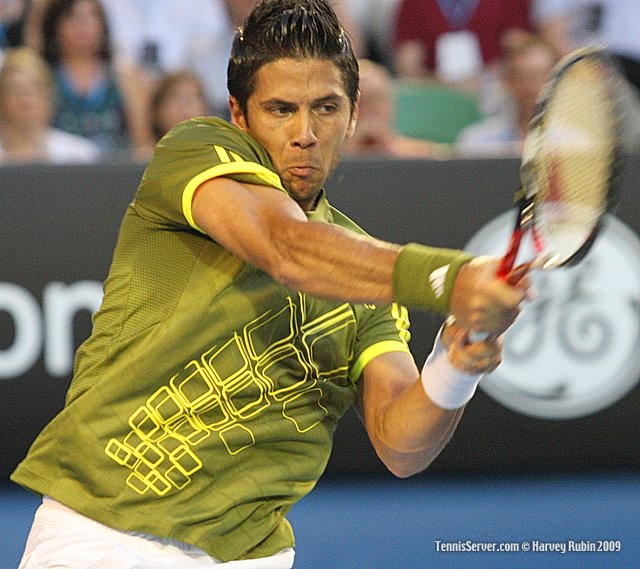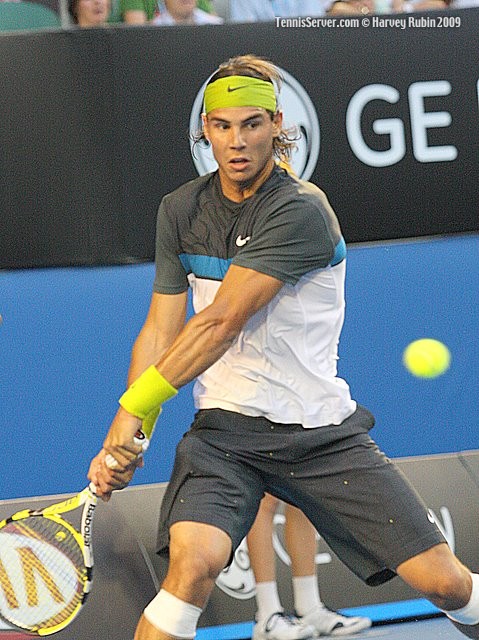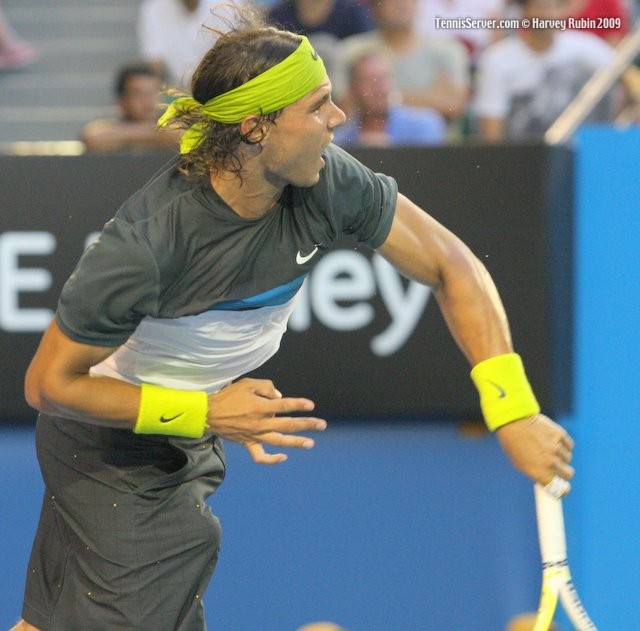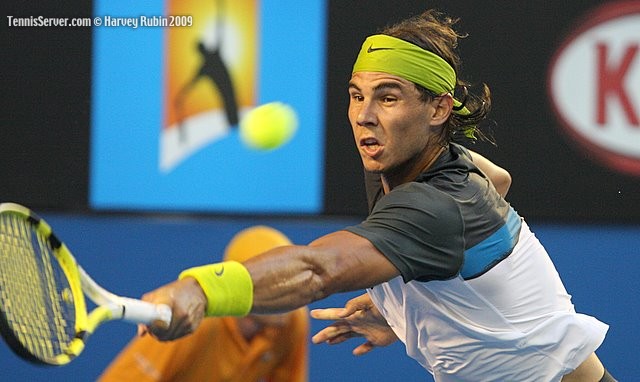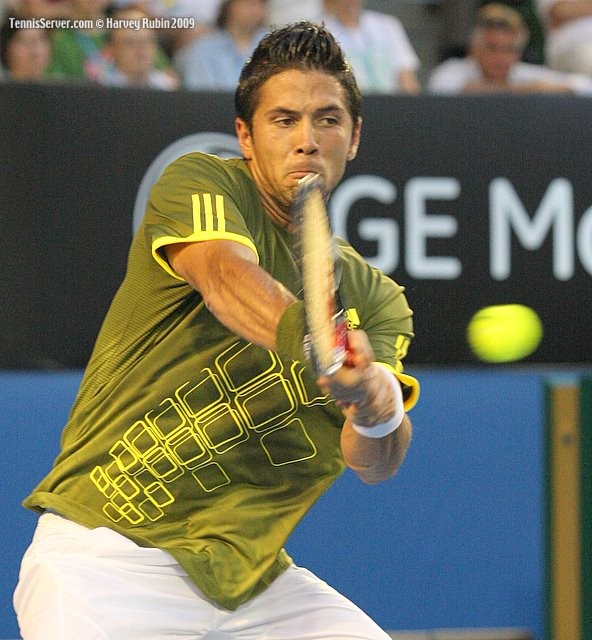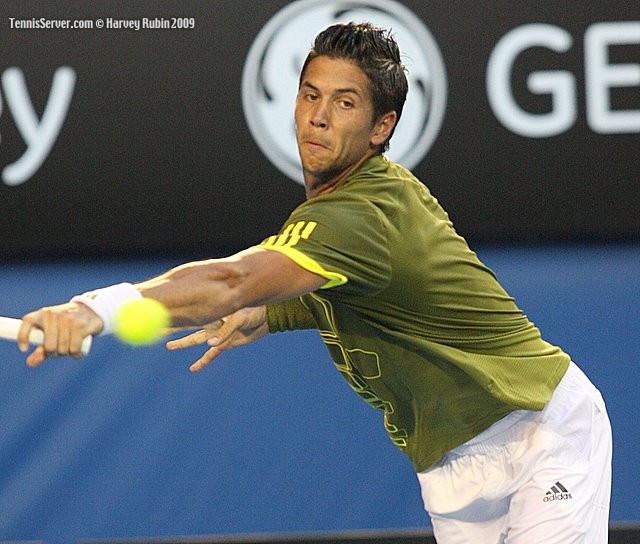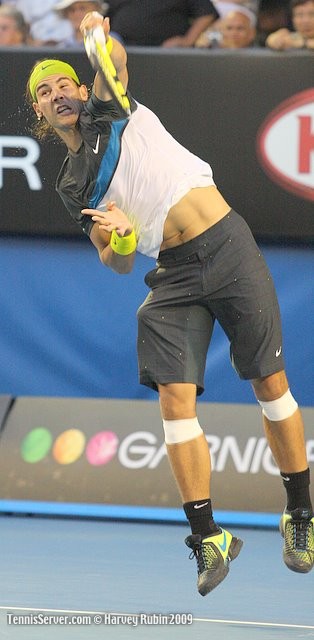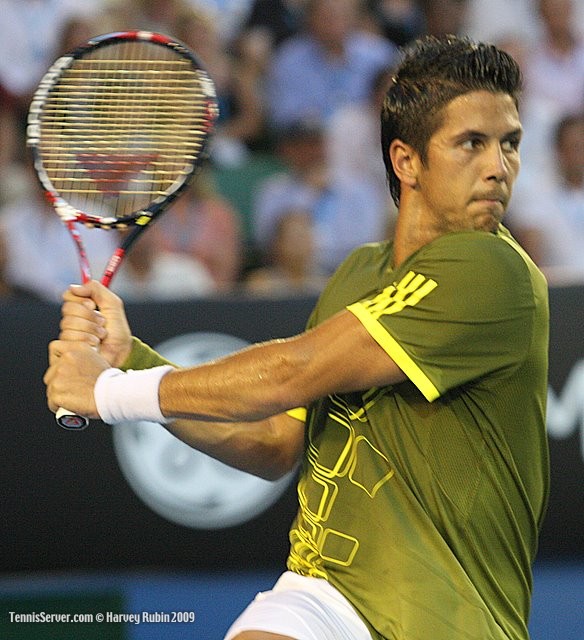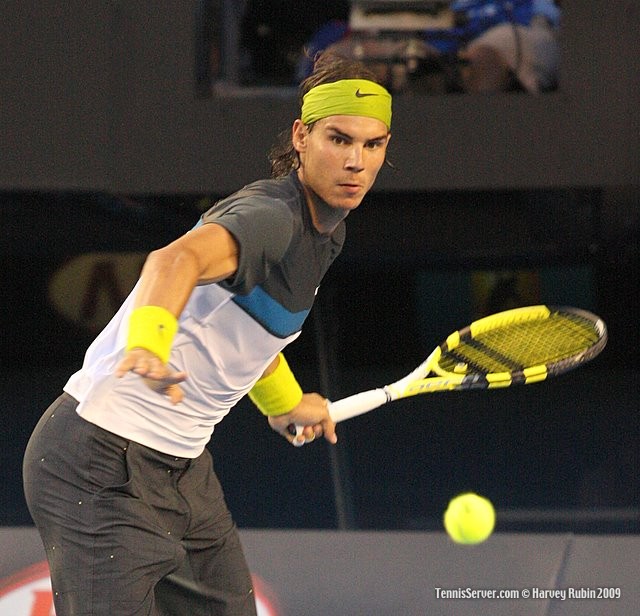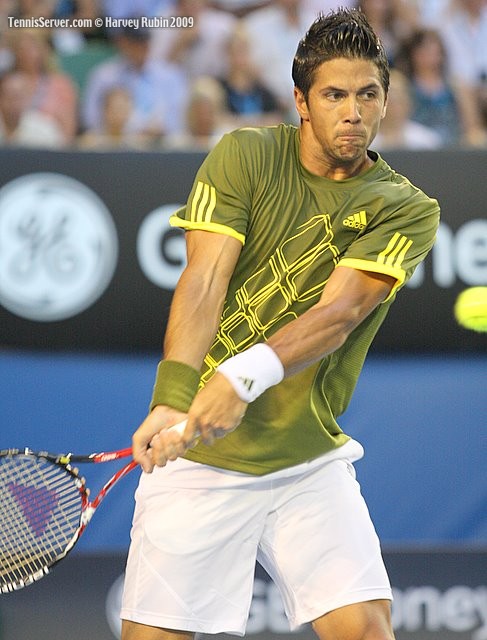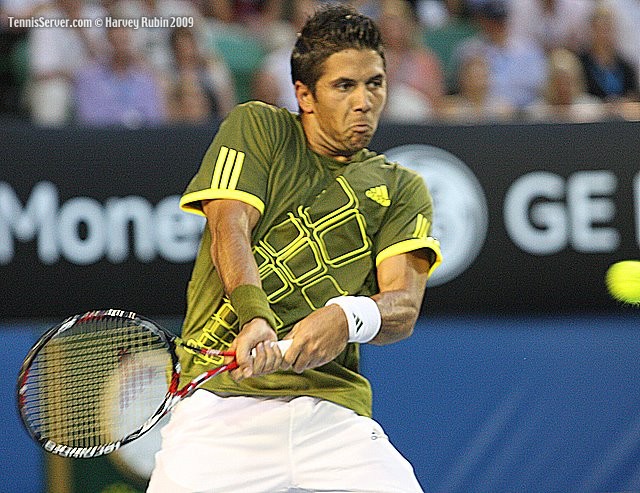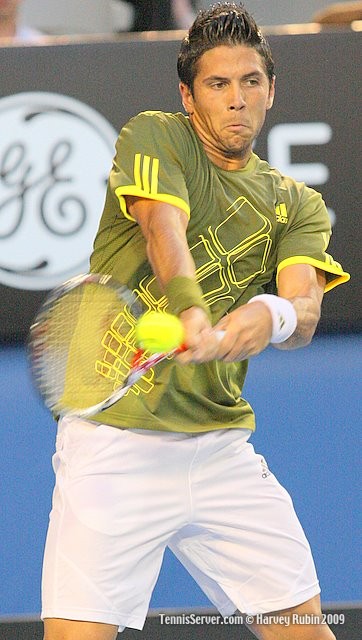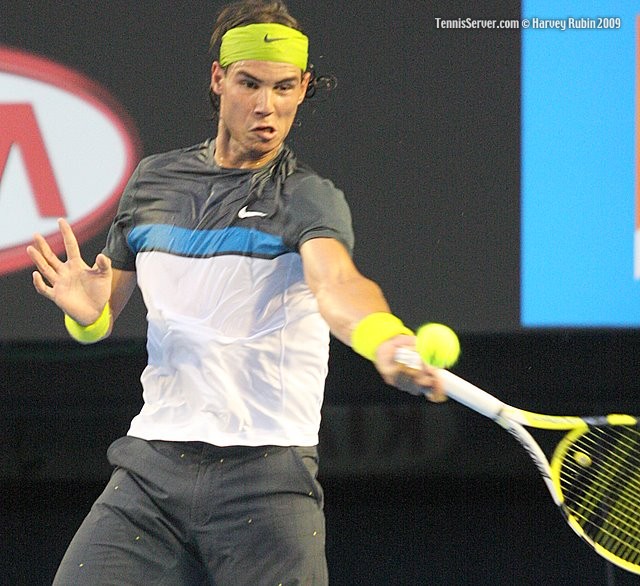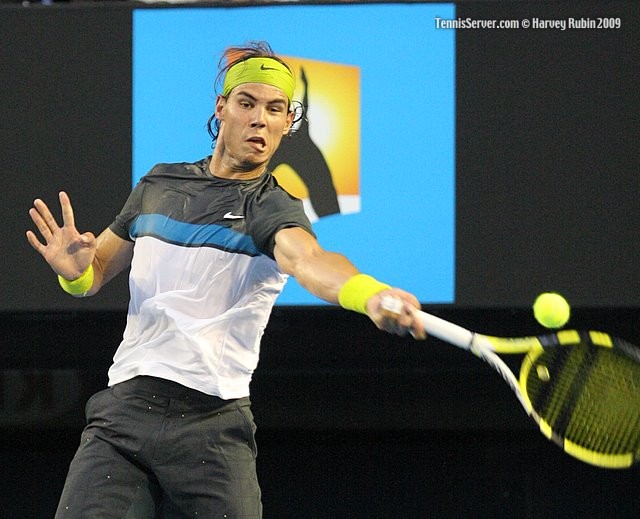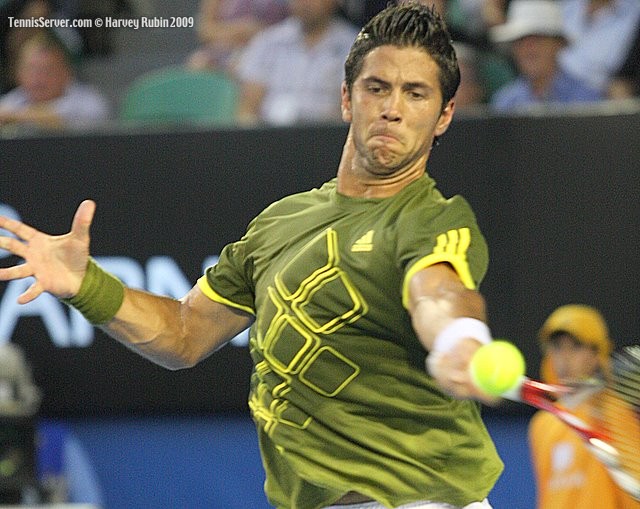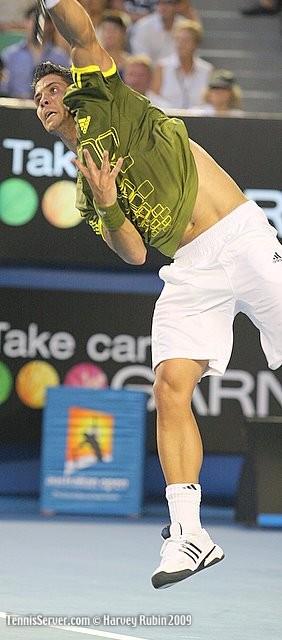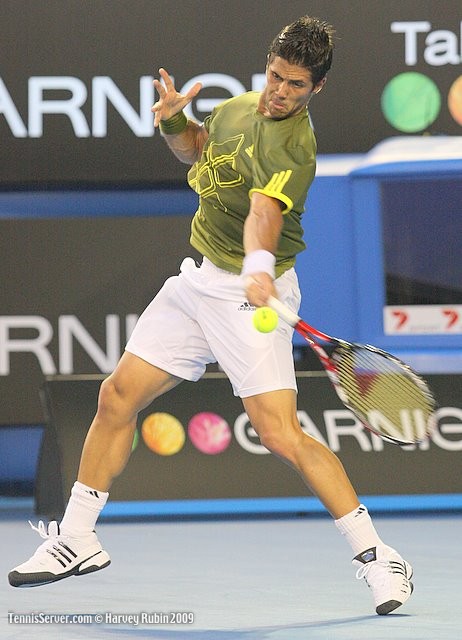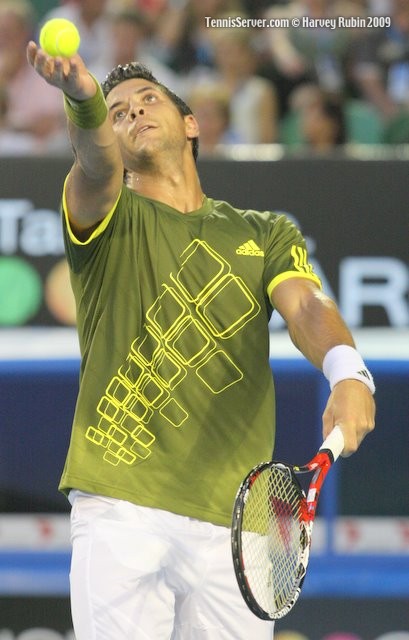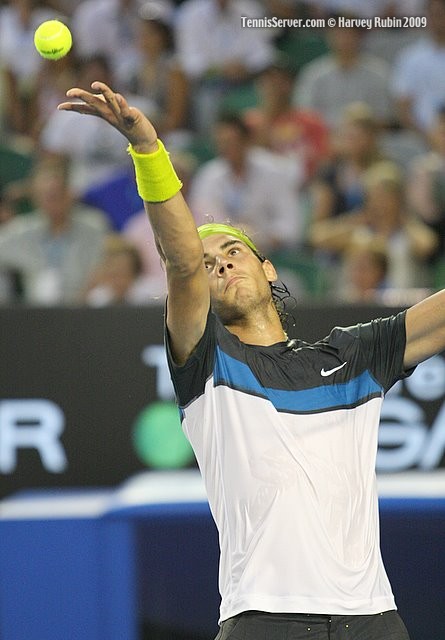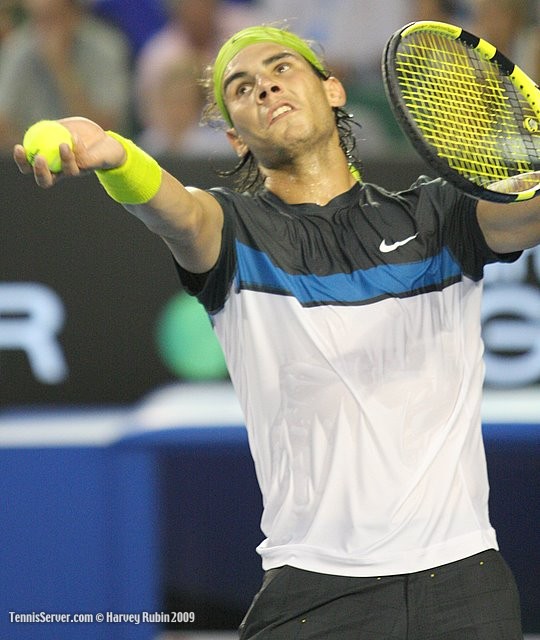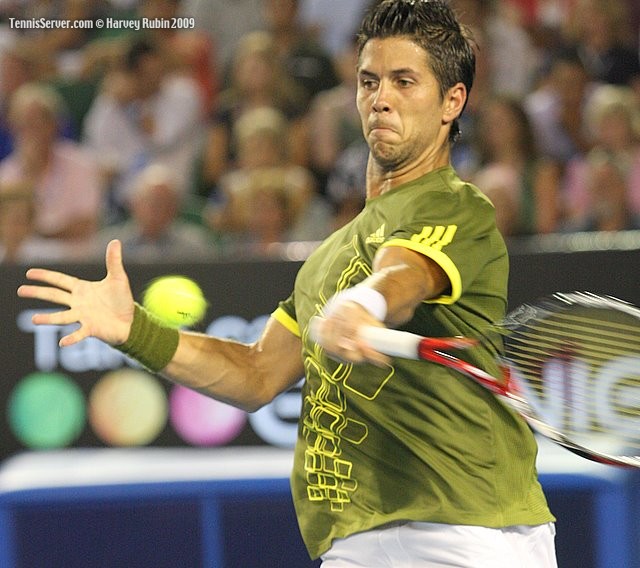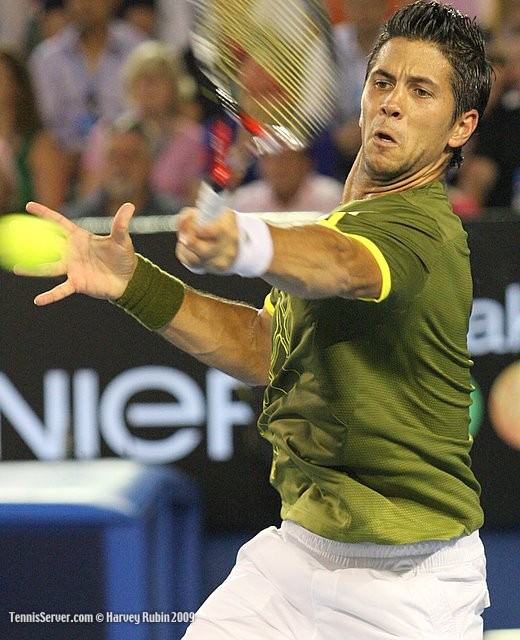Another Match For The Ages
January 30, 2009 -- Fernando Verdasco vindicated every club tennis player in the world when he double faulted on match point in the fifth set of his semifinal, giving his compatriot and #1 seed Rafael Nadal the win: 67(4) 64 76(2) 67(1) 64. In this the longest match ever to be played at The Australian Open -- five hours and fourteen minutes -- these two amazing athletes scrambled, danced, jabbed and screamed their way into the hearts of every fan in Rod Laver Arena.
Let it be known that from this day forward Fernando Verdasco will never be addressed as an underachiever again! With a total of 95 winners, including service winners, the surging Spaniard came a hair's width from eliminating Rafael Nadal the way Jo Wilfred-Tsonga eliminated Nadal last year in the semifinal of the Australian Open.
In the first set Verdasco dictated play, leaving the crowd quieter than usual. Nadal was supposed to be the one teaching his friend a lesson about Grand Slam semifinals. He had beaten him six out of six times. But, Verdasco was steady. The steely look on his face and in his eyes said it all -- I'm here to stay; I'm here to play.
Verdasco won the first set in a tiebreak at 4; it took one hour and fifteen minutes. Both players served extremely well: Nadal at 72% and his opponent at 76%. In the past, Verdasco found ways to undermine his brilliance and evoke negative comments from the press because his serve would fail him. Doubles faults were commonplace. Little did these players and fans know that double faults would plague him at the most inopportune time much later in the match.
The second set was the shortest: a measly 49 minutes. Nadal won it. The length and strength of their rallies seemed more like ones viewers would see on red clay, rather than on a hard-court. Rafa's first-serve percentage in this set skyrocketed to 89%. Both players continued to have healthy winner/error ratios. The quality was superb.
The third set rumbled the stadium. Rafael Nadal grit his teeth, executed shots no one could imagine in their wildest dreams. But so did Verdasco.
After five deuces in the second game of the third, Rafa broke. Here was the chink he needed -- a break. Now he would run away with the set. Verdasco would start to double fault. The routine nature of the match's outcome was apparent. But in the next game, Verdasco broke back at love.
Even though the third set had three breaks of serve, a tiebreak decided it. Verdasco played loose tennis, wracking up three unforced errors that sunk his chances to pull ahead two sets to one. Nadal was one set away from victory. Time lapsed in the match so far -- 2 hours and 50 minutes.
At changeovers both players donned an ice vest, chomped on fruit, drank sips of sport drinks and water. Verdasco had his legs rubbed after the third set, too, but didn't take a medical time out for fear of interrupting his concentration. For fear of drawing criticism. For fear of deflating his pride.
Verdasco had never been farther than the second round of a major. He was on uncharted court, but his performance never hinted of nerves. He played the first game of the fourth set with a renewed aggression. His strokes were smooth. They looked effortless, yet his muscles were visible ropes of fiber tensed to the maximum each time he struck a ball. The same can be said for his opponent -- "The Arm," as some have named Rafa.
Verdasco won 73% of points on his second serve while Nadal won only 43%, in the fourth. But as much as Verdasco pummeled his friend with flattened groundstrokes, Nadal kept retrieving. He ran down ball after ball, even when he had to spin on a dime, reverse direction, hit an overhead, and a short cross-court forehand on the run for a winner. This man never says die. Verdasco had to hit three winners to earn one point.
The fourth set wound up in a tiebreak, the third one of the match.
Fernando Verdasco played his best tennis here. He let his body take over completely. He swung out with all aspects of his physicality optimized. His mind took a back seat. He danced around the court, aggressively maneuvering the ball. His face seemed relaxed, except at the end of a winning point. Then he let loose a "VVVVAAAMMMOOOOOOOSSSSSSSSSSSSSSSSS," his mouth wide, his hand fanned and pointed at his support group in his player's box. His father looked on with pride. He was on the roller coaster, too, with his son. He put a racquet in his son's hand at the age of four, and here were the rewards of his decision. His son was having the match of his life.
These two players had been on court for four and a half hours at the beginning of the fifth set. As the set progressed, Rafa inched ahead. He held his games easily, some at love. However, Fernando began to struggle. He had to save multiple break points to stay even.
In the tenth game, with Rafa holding up 5/4, Verdasco hit two double faults. He had accumulated two other double faults in the entire match, before this game. One has to wonder if his thoughts wandered, started to interfere. Was there one thought that his serve might go off... a flickering awareness?
At love-forty the world's number one player could smell the finish line. But Verdasco held on, saving two break points. The score was 30/40. On the next point, Verdasco's first serve found the net cord. His second serve found it again. He had double faulted to lose the match. A disappointing end for an amazing talent.
The crowed watched as Rafa climbed over the net and approached his friend. Their embrace put the match in perspective. Their embrace completed the match perfectly.
Rafael Nadal had reached another level of his career, as had Fernando Verdasco. They both were victorious. For the match, Nadal won 193 points. Verdasco won 192 points. That's how tightly they played this semifinal.
Asked in his press conference about the two double faults in the last game, Fernando said, "Tennis is like this sometimes, no? What can I do? I was trying the same like in all the other games in the match. But, you know, just to try a good second serve, I played two double faults."
On his way to the locker room, Darren Cahill stopped an exhilarated Rafael Nadal. "I think I didn't play bad, no," he said.
The world agrees. Rafa didn't play bad.
Roger Federer will play Rafael Nadal in the final on Sunday evening. Both men will have played fifteen sets of tennis. This final will be the third leg of their mini Grand Slam. They have faced each other in the finals of The French Open and Wimbledon. They could very possibly meet in the finals of all four Grand Slams if the year matches up to the tennis we've witnessed at Melbourne Park.
Yesterday, Roger was asked if he would prefer to face Rafa or Fernando in the final. He complimented both players, but concluded that a match between the world's number one and two would be the most exciting.
Rafael Nadal mentioned in a press conference that he would like to see Roger Federer earn his 14th Grand Slam title. He just doesn't want him to win it when he's on the other side of the net.
Game on!





 You will join 13,000 other subscribers in receiving news of updates to the Tennis Server along with monthly tennis tips from tennis pro Tom Veneziano.
You will join 13,000 other subscribers in receiving news of updates to the Tennis Server along with monthly tennis tips from tennis pro Tom Veneziano. 
